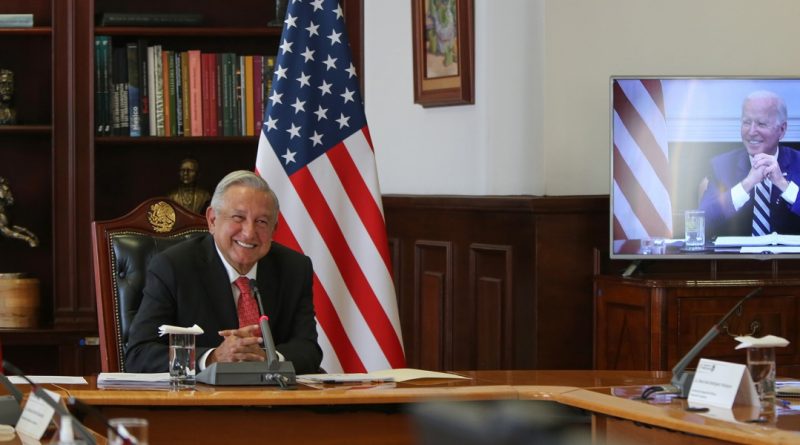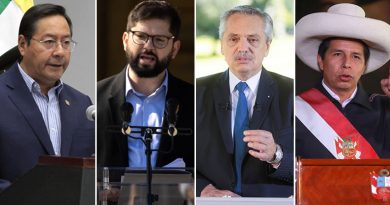The Past & Future of the Mexico-US Relationship
Kawsachun News spoke to two Mexican journalists, Alina Duarte and Jose Luis Granados Ceja, both in Mexico City, about the nature of the US-Mexico relationship, and if the new Biden administration will represent an opening for Mexico to promote its interests, or if this will be an even more formidable and interventionist enemy.
By Oliver Vargas and Kathryn Ledebur
OV: The US ‘War on Drugs’ in Mexico has cast such a shadow over bilateral relations. How can that conflict be characterized?
Jose Luis: We are living in a real crisis of insecurity and of violations of human rights due to this issue of organised crime and narcotrafficking. In the case of Mexico, it’s important to put things in context, when we discuss the ‘national security doctrine’ in the US, we have to understand it as a means by which the US elites advance their interests throughout the world. Before it was the ‘fight against communism’, which in Mexico we had in the form of the ‘dirty war’ in which human rights were violated on a massive scale, particularly those of union leaders who were targeted in the name of fighting communism. Once the cold war ended they had to re-orientate national security doctrine to do the same job but under the pretext of the ‘war on drugs’ as the new justification. The aim is the same, use the repressive state forces, whether they be Mexican or foreign, to take control of land and politics. What do I mean by taking control of land? The purpose is to take control of the resources of a given territory, something that has always been the primary interest of the United States, and many others, in Latin America. That’s why we say that there is no ‘war against the narco’, instead, there’s a war between narcos. The moment in which this intensified was under the presidency of Felipe Calderon (PAN) who sought to legitimise his rule through this ‘war on drugs’ after taking power through electoral fraud, he had to urgently concentrate power around him because it wasn’t at all clear that he’d hold on as President. That war between narcos that President Calderon unleashed was a form by which he could push through other unpopular policies like neoliberal labour and energy reforms. So we can see how the ‘war on drugs’ can be used as a pretext to militarize the country because there are other interests at play.
OV: How has that situation changed with Andres Manuel Lopez Obrador? Will the Biden administration present an era for Mexico-US relations?
Jose Luis: The crisis of violence and insecurity remains of course, but this year was the first in 5 years in which there’s been a small reduction in violent crime. The strategy has changed. Lopez Obrador does face an extremely difficult situation, but there are still criticisms to be made, such as his creation of a new security force known as the ‘National Guard’. However, it needs to highlight that this government, unlike past ones, no longer talks of being ‘at war’, no talk of an armed conflict against narcotrafficking, instead they talk about addressing the causes of Mexico’s situation. For example, there is a conversation that’s asking why so many young people are sucked into the narco world, well for many years working class young people have been abandoned and were discriminated against with names such as ‘Nini’ (neither in work nor education), but of course, those young people have to make their way in the world and bring home food for their families, so when there aren’t any opportunities, well, they fall into organized crime. It’s a complex situation and it’s linked to the interests of the United States. The US has a new President, Joe Biden, but Joe Biden is an architect of Plan Colombia, he says it himself and boasts about it, but we all know that is was a failure because the militarization that resulted in has only served to kill huge numbers of union and community leaders, while narco trafficking increases. So when Biden says that he hopes to do the same elsewhere, we know that’s a danger for us. What’s interesting is that Lopez Obrador had some space with Trump. Lopez Obrador wants to do away with the neoliberal energy reforms and to ensure that natural resources are in state hands and used to benefit the people, he was allowed to pursue that if he met Trumps on migrations, that should be condemned because that was a terrible policy for our Central American brothers. But the worry now is that Biden could be more interventionist on issues such as natural resources, the war on drugs and labour reform.
OV: How is the change of the US government seen in Mexico? Is it seen to be an opportunity for better relations?
Alina Duarte: Mexico has always had an extremely complicated relationship to the US, it’d be naive to think that Joe Biden would lead to a 180 degree turn in that sphere. Lopez Obrador has opted for fluid and open communications with the North, many thought there’d be a tense relationship with Trump, but actually there lots of areas in which Mexico has been able to advance its interests. They didn’t have to pay for Trump’s wall, but they built their own on their southern border. In Mexico, this relationship was presented as a great victory for Lopez Obrador who had managed to demand respect for the country’s sovereignty and even had the gaul to enter the White House and shout ‘Viva Mexico’ in one instance. Though, the US of course has always had its usual advantages over us. Nevertheless, one achievement that can be pointed to is how the Mexican Senate, with the support of Lopez Obrador, managed to pass a law that limits and regulates foriegn (US) agents within the country. So that means that the DEA can no longer simply do as they please, they now have a strict regulatory framework set by Mexico that has made the US deeply uncomfortable. Another point of tension has been General Cienfuegos, an ex-Defense Minister under Pena Nieto who was arrested in the US, but Mexico demanded his return so that they can investigate their own accused, making it a question of sovereignty. Then when Cienfuegos was returned, he was freed and AMLO published the evidence against the former General, given to him by the DEA, thereby revealing the weak case against him. The DEA has been a point of tension between Trump and Lopez Obrador, nevertheless, there isn’t any naivety here about the possibility of the US changing their foreign policy just because the Democrats are in power, Mexico has profoundly bad experiences with both Republican and Democratic administrations. All Mexico wants is respect, Lopez Obrador managed to not fall into a confrontation with Donal Trump, sometimes using various tactics like creating the ‘National Guard’ along the border so as to avoid militarization, but the US will always be the US.
KL: Can you speak a bit about the effects of having the Mexico-US relations under the shadow of Narcotrafficking?
Alina Duarte: In Mexico, there is a before and after 2006, which is when Felipe Calderon carried out electoral fraud against then candidate Andres Manuel. So to secure his position at the top, he launched the Merida Initiative, similar to ‘Plan Colombia’, which in the name of fighting the ‘War on Drugs’ actually turned the country into a Narco-state and unleashed a brutal war against the general population, along with the DEA, IMF and the rest of US imperialism. The narco groups strengthened their alliances, the industry was consolidated, the result was hundreds of thousands dead, countless disappeared, particularly in the north of the country, there were huge waves of violence against women which was due to the absense of the state, the growth of narco-trafficking, the Maquilas factories, the US pressure at the border zone. Mexico had fallen into a civil war and it’s something we’re still living with today. Andres Manuel has changed this security strategy somewhat. He’s taken the troops off the streets and increased their wages. Lots of soldiers were growing tired of this war, it’s they who were dying too in this so called ‘war on drugs’. The ‘national guard has been created, but we can see the violent manner in which they’re used against migrants from Central America. Mexico has also recovered some sovereignty where there was none before, particularly on foreign policy, look at Mexico’s role in the OAS, our Foreign Minister spoke against Israel and for Palestine, something that’s never happened in my memory! There’s been a huge change in foreign policy, but on the issue of the bilateral relationship with the US, the DEA worsened the dangerous situation in Mexico, the manner in which the US treated us as their backyard, there was the ‘Operation Fast & Furious’ that flooded Mexico with thousands of guns from the US, supposedly to ‘monitor’ their use, but all of which ended up in the hands of these criminal groups, some of these guns were even used to kill DEA agents and US border guards! That is the level of chaos that takes place everyday in this country, something that has got even worse during the pandemic. The DEA has a huge role to play in this, they’re operating in at least 11 states. Under these conditions of impunity and colonialism, we’ll probably never know how many agents are operating here, at least Andres Manuel has pledged to regulate them, he hasn’t said that he’ll expel them, but he recognises that the state doesn’t even know how many US agents there are in the country and that that’s unacceptable. That is a key point of tension with the US.
KL: What about Trump’s brutal migration policy? Is there any hope that Biden could have a better policy with Mexico?
Alina Duarte: There have been a number of executive orders signed with the aim of relieving the pressure of the mass movement that exploded after the killing of George Floyd that paralyzed 40 cities across the US. It laid bare the state that the oppressed inside the empire. Biden’s response, like Obama before him, was to use issues such as migration as political football by trying to win votes with a pro-migrant discourse and hoping people forget about the deportations under Obama. However they portray Donald Trump, this current nightmare started for migrants started with Obamas detention centres. But the fact that Joe Biden has been forced to take that discourse shows the power of the pressure he faced in the streets, so now he needs to find a way to open a pressure valve. He’s not talking about giving citizenship to those who are undocumented, but he is talking of easing the process for 9 million people who need it, he’s also talking about the Dreamers, he’s creating a task force for family reunification, he’s talking about suspending contracts for private prisons. He’s not talking about the detention centres though, these are centres that activists call concentration camps. But that hasn’t stopped them going for a certain identity politics discourse, using Kamala Harris to say that since there’s a black VP then that’s racism solved, like they did after Obama’s win in 2008. Mexico has maintained a certain cordiality with the US and been able to defend its sovereignty, but it’s been at the cost of repressing migrants on behalf of the US, particularly the caravans, I saw first hand the violence of both Mexican and US security forces there. That whole approach to migrants has been carried out with the approval of Republicans and Democrats, so why should we believe that there’d be a change? The bipartisanism extends to economic issues, particular to foreign policy. I don’t think this will change under Joe Biden.



